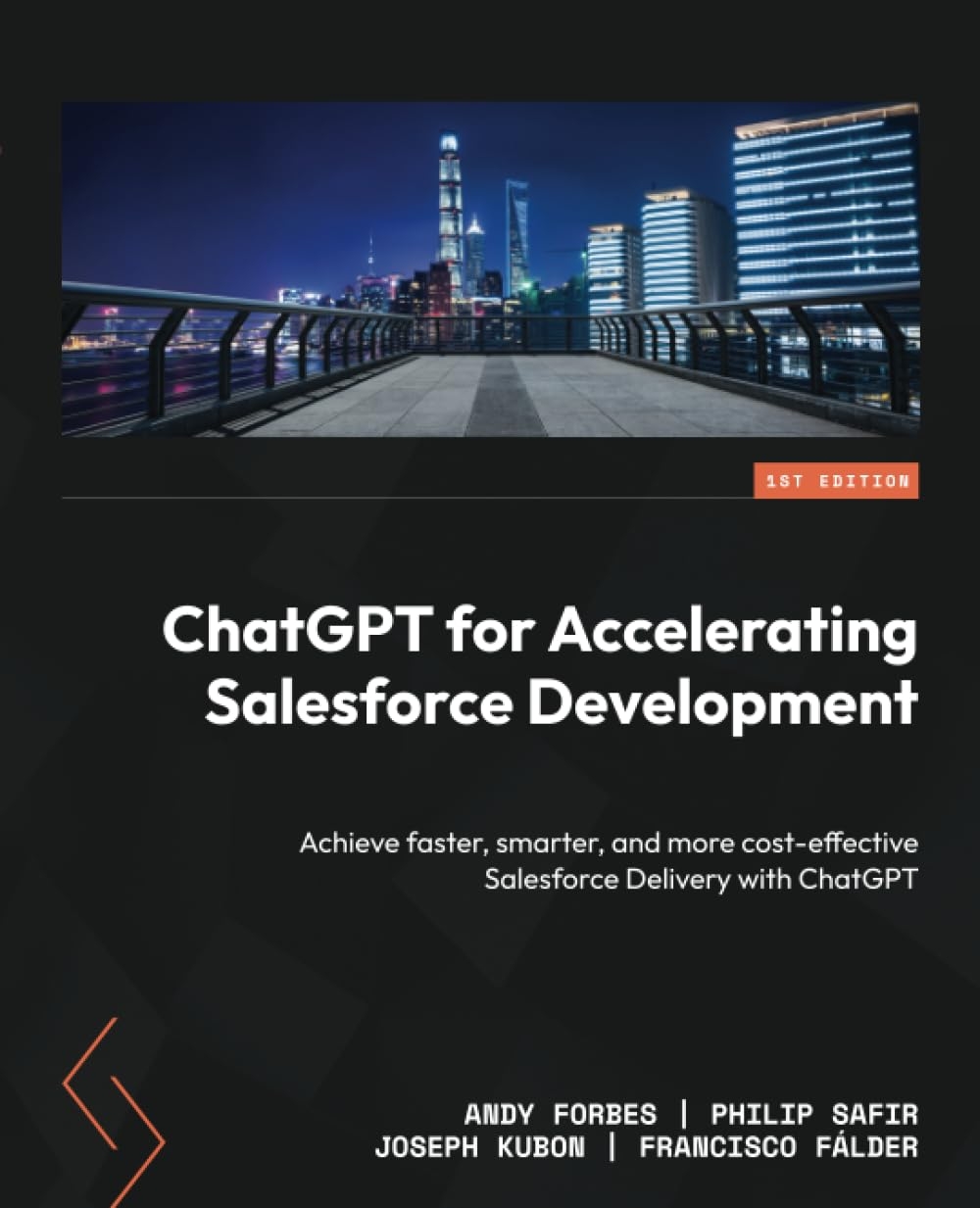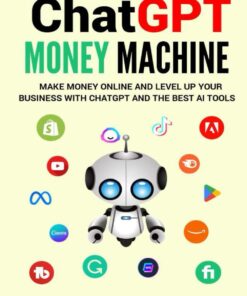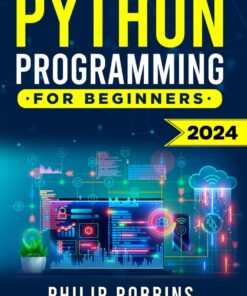Description
Editorial Reviews
Review
“One of the reasons the book is such a valuable resource is because of the range of topics covered. I was pleasantly surprised at how well the book addressed additional topics, not as technical in nature, such as using ChatGPT for Salesforce project documentation and creating Salesforce user stories.”
Joyce Avila, Salesforce All Star Ranger and Einstein Champion Alumni
“This book serves as a comprehensive guide, skillfully breaking down the complexities of AI in Salesforce, making it accessible to all—from project managers to seasoned developers. The authors share a wealth of knowledge, providing a practical roadmap for amplifying Salesforce projects with ChatGPT.
What stands out are the chapters on feature design, Apex code enhancement, and crafting user stories, brimming with actionable insights and real-life examples that truly resonate. The book brilliantly simplifies intricate AI concepts into practical strategies, propelling innovation and efficiency in Salesforce development.”
Ishrat Bhatti, Senior Technology Analyst, Salesforce Center of Excellence, Southwest Airlines
About the Author
Andy Forbes stands at the vanguard of technological innovation. With a career spanning four decades, he is currently focusing his robust IT background on exploring the transformative potential of artificial intelligence, particularly Generative AI, on Salesforce project delivery. Andy has honed a deep expertise in CRM and project management which is backed by his repertoire of ITIL and Salesforce certifications. Andy’s eight-year tenure at a Global Systems Integrator, coupled with his entrepreneurial spirit, has propelled him to the leadership of multiple Salesforce projects for Fortune 500 clients.
Philip Safir is a consulting executive and business architect. He serves enterprises via delivery of technology roadmaps, process improvement, and solutions on the Salesforce platform. As the Head of Salesforce Professional Services Delivery & Talent for a Global Systems Integrator, he is responsible for a team of 250 consultants and a $100M portfolio. His career spans Fortune 500, start-up, and international clients across various industry domains like Manufacturing, Retail, Financial Services, Telecom, and so on.
Joseph Kubon, an experienced Solution Architect for global enterprise deliveries, Salesforce MVP with 40+ Salesforce certifications and inventor (holding several patents), navigates the realms of manufacturing, health and media industries with a results-driven approach. Skilled in Agile methodologies, Business Process, and Architecture values, he carries a toolkit replete with Salesforce configuration and customization expertise for groundbreaking development. Guided by the wisdom that ‘just because it can be built doesn’t mean it should be’, Joseph embraces the multiplicity of solutions to tomorrow’s challenges measuring success with his “Time to Value” principles.
Francisco Fálder is a seasoned Salesforce maven and master of digital transformation. His career stands as a testament to a commitment to delivering top-tier, complex projects, seamlessly merging business and tech to deliver standout customer experiences. With every project, Paco re-imagines and redefines the digital landscape, fostering an environment where innovation is not only encouraged but celebrated. Passionate about the ever-evolving tech world, he has honed a deep-rooted affinity for Artificial Intelligence, Continuous Integration/Continuous Deployment (CI/CD), and Agile methodologies.





Kasif Imran –
I recently dove into the book “ChatGPT for Accelerating Salesforce Development,” and it has completely transformed the way I approach my work in Salesforce. Let’s talk about Chapter 6: Using ChatGPT for Salesforce Apex.This chapter brilliantly explores the marriage of AI and Apex programming, elevating the coding experience to a whole new level. The insights provided by ChatGPT into optimizing Apex logic and structure are nothing short of revolutionary. As a seasoned developer, I found the AI-generated suggestions not only insightful but incredibly practical. It’s like having a coding genius sitting right beside you, guiding you through the intricacies of Apex development.The style of the chapter strikes a perfect balance between in-depth technical details and user-friendly explanations. The readability is commendable, making it accessible for both beginners and experienced developers. The relevance of the examples showcased solidifies the applicability of ChatGPT in real-world scenarios, giving me the confidence to implement these AI-powered insights in my daily work.Now, let’s shift gears to Chapter 10: Using ChatGPT for Salesforce Project Documentation. As someone who often grapples with documentation challenges, this chapter was a game-changer. The AI-driven approach to streamline documentation processes is a breath of fresh air. The book doesn’t just stop at teaching you how to use ChatGPT; it shows you how to integrate it seamlessly into your workflow, saving time and ensuring documentation is a breeze.The unique perspective brought into the book by focusing on the intersection of AI and Salesforce is unparalleled. It caters to the needs of both developers and administrators, making it an indispensable resource for anyone working in the Salesforce ecosystem. The author’s innovative use of AI in various aspects of Salesforce development reflects a forward-thinking approach that is essential in today’s fast-paced tech landscape.In conclusion, “ChatGPT for Accelerating Salesforce Development” is a must-read for anyone looking to harness the power of AI in their Salesforce journey. The chapters I’ve highlighted are just a glimpse into the wealth of knowledge this book offers. Whether you’re a seasoned professional or a novice in the field, this book will undoubtedly leave you inspired and equipped to take your Salesforce development to new heights.
Tesla Pilot –
Though Andy clearly advises this book is not meant to be read cover to cover, I wanted to go through [most of ] it before writing this review. I never review Amazon purchases on day one- unless they crumble right off the package. This one certainly didn’t.The book’s target audience is intermediate salesforce technical architects and developers. Some chapters can be helpful to both advanced developers and administration initiates.I particularly enjoyed chapter 5, “Using Chat GPT to decipher someone else’s code”. As this is something I constantly do, it gave me a few tips on how to improve my GPT responses. I’m not too sure about Chapter 3, ‘Salesforce Flows’, within which I expected to read on how to obtain actual XML in the responses or even insert XML and have GPT interpret the flow. It would seem the model is not quite there yet.I enjoyed the most reading through the appendixes, which provide useful insight into leveraging ChatGPT across most stages of a Salesforce Agile development endeavor, and the pitfalls to be avoided while using the LLM, as the tool is good but not infallible.
I. Cheriyathu –
I was pleasantly surprised by how accessible the book made the integration of Generative AI into Salesforce development. As a Project Manager overseeing complex Salesforce implementations, my role isn’t technical, but understanding the possibilities that AI offers is crucial. Overall, the book helped demistify AI for me.The chapter on using ChatGPT for Salesforce Feature design resonated with me deeply. The practical insights shared here opened my eyes to how GenAI could foster innovation, not just for developers but also for project managers like me who sometimes have to wear an architect hat.Also, the chapter on What’s Next provides a thoughtful conclusion. It encourages Salesforce professionals, regardless of their role, to explore new horizons with AI. The books approach, blending technical insights with practical application, aligns with my role’s demands, making it an invaluable source.Overall, the book goes beyond the technical; it is a trailblazing guide for anyone in the Salesforce ecosystem. While this is focused on Salesforce, I am convinced that the lessons apply to any platform that you may use. The book is a testament to the evolving landscape of GenAI assisted development, and I wholeheartedly recommend it to fellow professionals looking to chart a successful AI-powered journey.
Chelyn Briand –
What truly sets this book apart is the collective expertise of its authors – Andy Forbes, Philip Safir, Joseph Kubon, and Francisco Fálder. They bring together a wealth of knowledge and experience, delivering powerful insights and actionable advice throughout the book. Their ability to demystify complex concepts and present them in an accessible format is commendable.ChatGPT for Accelerating Salesforce Development” is more than just a guide; it’s a resource that will remain valuable as you navigate the evolving landscape of Salesforce development. It’s a must-have for those looking to enhance their Salesforce projects with the innovative use of AI, providing a clear roadmap to achieving faster, more cost-effective delivery.
Thomas –
As a Salesforce consultant, ‘ChatGPT for Accelerating Salesforce Development’ stands out as a valuable resource! Explored Chapter 11: Crafting User Stories, and the AI-powered insights are invaluable. My efficiency in creating detailed user stories tailored for Salesforce projects has seen a remarkable boost already! Whether you’re just starting or have years of experience, this resource enhances Salesforce processes efficiently. The book’s practical examples resonate well with Salesforce professionals, making it a highly recommended guide for integrating AI into every project stage.
Oziel C. –
As a Salesforce Solution Architect, I can only conclude that “ChatGPT for Accelerating Salesforce Development” was a revelation that transcended my expectations. The book not only opens the door to the fascinating world of AI integration but also provides invaluable insights, especially in Chapters 5, 6, and 11.Chapter 5, “Using ChatGPT for Salesforce Apex That Someone Else Wrote,” immediately caught my attention. The practical advice on deciphering and enhancing existing Apex code with AI assistance is a game-changer. The author not only emphasizes the importance of understanding someone else’s code but also demonstrates how ChatGPT can streamline this process, making it less daunting and more collaborative. The real-world examples were not just illustrative but truly bridged the gap between theory and application. Most of us had issues or complexity when we get a new project that continues someone else’s work.Let’s dive into the brilliance of Chapter 6: ‘Using ChatGPT for Salesforce Apex.’ This chapter not only demystifies the complexities of Apex programming but elevates it to new heights with the infusion of AI-generated insights. The author’s approach is both systematic and innovative, providing a step-by-step guide to enhance one’s coding prowess. What sets this chapter apart is its practicality; it doesn’t just talk about theories but presents tangible examples, making it an invaluable resource for both beginners and seasoned developers.Chapter 11, “Using ChatGPT for Salesforce User Stories,” adds a layer of analytical prowess to the creative process of crafting and refining user stories. This chapter is a testament to the book’s unique perspective, as it doesn’t just focus on the technical aspects but also highlights the collaborative potential between AI and human creativity. The author’s personal touch shines through as they explore how ChatGPT can enhance the clarity and precision of user stories, ensuring a smoother transition from conception to implementation. Which again in my opinion will make the work easier and faster than it is now.In terms of readability, the book strikes a perfect balance between depth and accessibility. The language used is clear, and the step-by-step approach in each chapter aids understanding. The random focus area of analytical capabilities adds a unique dimension to the book, positioning it as not just a technical guide but a tool for augmenting creativity and problem-solving in Salesforce development.In conclusion, ‘ChatGPT for Accelerating Salesforce Development’ is a must-read for any Salesforce professional looking to harness the potential of AI in their daily development tasks. The book doesn’t just teach; it inspires and transforms, leaving you with newfound confidence in exploring the limitless opportunities at the intersection of AI and Salesforce. I eagerly look forward to the future possibilities that this book has ignited in my Salesforce specialist journey.
Rajat –
Diving into the world of “ChatGPT for Accelerating Salesforce Development” was like discovering a hidden gem in the expansive realm of tech literature. As both an architect and developer navigating the intricacies of Salesforce, I found this book to be nothing short of a revelation.Chapter 5, aptly titled “Using ChatGPT for Salesforce Apex That Someone Else Wrote,” resonated deeply with my dual roles. The authors skillfully guide readers through the labyrinth of foreign Apex code, making it not only comprehensible but also providing a roadmap for improvement. As an architect, the practical applications of ChatGPT in unraveling and enhancing existing code struck a chord. The book doesn’t just offer theoretical insights; it equips architects like myself with tangible tools to fortify and optimize systems. The relevance of examples within this chapter is impeccable, providing a hands-on guide for architects seeking to navigate the challenges of diverse codebases.Transitioning to Chapter 6, “Using ChatGPT for Salesforce Apex: Elevate your Apex programming with AI-generated insights,” the book takes a leap into the future of development. The innovative use of AI in this chapter is nothing short of exhilarating. As a developer, the prospect of having an AI ally to generate nuanced insights and suggestions for Apex programming is a game-changer. The authors seamlessly integrate AI into the developer’s toolkit, transforming it from a set of tools into a dynamic collaboration with an AI partner. The applicability of techniques described in this chapter goes beyond coding; it touches the essence of how developers envision and implement solutions.What truly sets this book apart is its unwavering focus on collaboration. From an architect’s standpoint, the collaborative nature of integrating ChatGPT into development processes is revolutionary. It’s not just about understanding and enhancing code; it’s about architects and developers working hand in hand with AI to craft solutions that transcend traditional boundaries.In conclusion, “ChatGPT for Accelerating Salesforce Development” is a triumph for both architects and developers. It seamlessly bridges the gap between understanding existing codebases and propelling the future of Apex programming with AI-generated insights. The book’s enthusiastic embrace of collaboration and its practical applications make it an indispensable resource for anyone navigating the dynamic landscape of Salesforce development. Kudos to the authors for crafting a guide that not only educates but ignites a passion for the limitless possibilities that AI brings to the Salesforce ecosystem.
Patrick Coglianese –
As the use (or expectation of use) of Generative AI tools enters boardrooms and delivery teams alike, many of us are looking for signposts, trail markers, or any signals we can find on how to chart the correct path for our organization’s use of these powerful new tools. Fortunately, through the considerable collective expertise of Andy Forbes, Philip Safir, Joseph Kubon, and Francisco Esteban Falder Rodriguez, this book provides a veritable GPS system for your team. It is as comprehensive and holistic as a guide can get, in how to maximize your organization’s use of the Salesforce platform, by leveraging the game-changing power of ChatGPT.More than just pointing to the ‘big picture’ possibilities of generative AI tools, this book pierces the veil on how to form a practical, more tactical view of establishing real, immediate value to building with Salesforce. Each chapter identifies a step by step approach to adopting a multitude of current Salesforce tasks and operations into being ChatGPT-driven. Everything from use case and documentation writing to code generation and testing is covered, at a level of detail that enables anyone to execute them successfully. The opportunity to fully empower your Salesforce teams with step-change improvements across the full gamut of platform delivery is staggering- not just in the overall scope, but in how readily adaptable to any organization it all is. Far from simply ‘unleashing’ ChatGPT, the authors will help break down for you how to ensure you effectively channel the tool into something that is more productive than unpredictable, and establish a process that will provide consistency and quality instead of one-off or encapsulated solutions.This book provided critical foundational understanding for me, in defining the plan and approach I am taking in leading my team towards better adoption of generative AI tools on our own Salesforce platform. I’m sure it will be a resource I return to repeatedly along the way to continue to pull out new ideas, and I’m confident that by following the insights and wisdom in in this book, my team’s ability to rapidly drive platform growth for our stakeholders will only continue to accelerate.
SKM –
I highly recommend “ChatGPT for Accelerating Salesforce Development” to anyone in the Salesforce space, both technical and non-technical readers alike.You’ll gain an excellent understanding of how to effectively utilize generative AI to accelerate learning curves, streamline code, improve processes, and drive real innovation. Not only does it delve into all aspects of the development lifecycle, but it also explores use cases for the broader project lifecycle as well. It offers thought-provoking approaches, practical examples, and step-by-step instructions.It’s a must-read that will definitely change your perspective on how to leverage ChatGPT!
David Rubin –
“ChatGPT for Accelerating Salesforce Development” is a revelation for Salesforce developers. Authored by a team of experts, including Andy Forbes, Philip Saffer, Joseph Kubon, and Francisco Fálder, this book serves as a roadmap to revolutionizing Salesforce development practices with the power of ChatGPT.The book meticulously details how to integrate ChatGPT into Salesforce development, making the process faster, more efficient, and cost-effective. The authors’ deep understanding of both Salesforce and ChatGPT shines through every page, offering readers a blend of technical guidance and strategic insight.What sets this book apart is its practical approach. It’s filled with real-world applications, examples, and tips that I found immediately applicable to my projects. The writing style is clear and accessible, making even the most complex concepts easy to understand.One of the highlights for me was the emphasis on innovation and problem-solving. The book encourages developers to think creatively about how ChatGPT can solve common development challenges, pushing the boundaries of what’s possible in Salesforce development.In conclusion, “ChatGPT for Accelerating Salesforce Development” is an essential read for anyone involved in Salesforce. Whether you’re a seasoned developer or just starting, this book will equip you with the knowledge to leverage ChatGPT effectively, transforming your development process and outcomes. Five stars for a truly invaluable resource in the evolving landscape of Salesforce development.